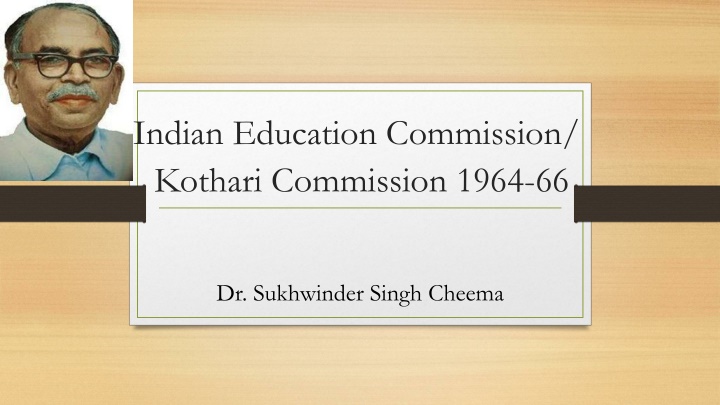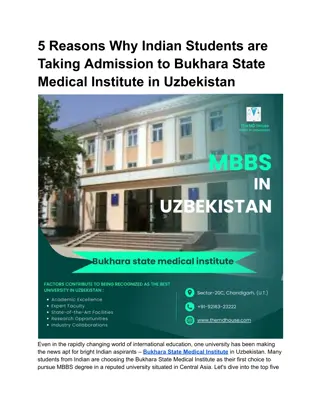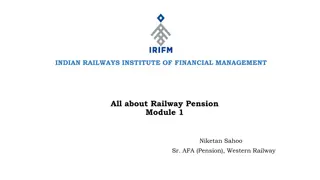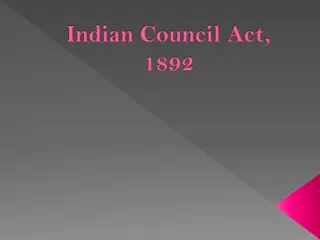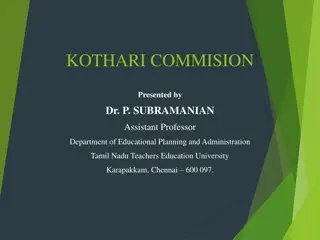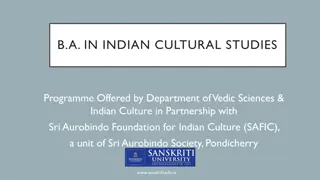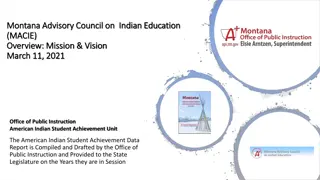Indian Education Commission - Kothari Commission 1964-66 Overview
The Indian Education Commission, also known as the Kothari Commission, was appointed in 1964-66 to address education-related challenges in India. Learn about its appointment, members, and unique features.
Download Presentation

Please find below an Image/Link to download the presentation.
The content on the website is provided AS IS for your information and personal use only. It may not be sold, licensed, or shared on other websites without obtaining consent from the author.If you encounter any issues during the download, it is possible that the publisher has removed the file from their server.
You are allowed to download the files provided on this website for personal or commercial use, subject to the condition that they are used lawfully. All files are the property of their respective owners.
The content on the website is provided AS IS for your information and personal use only. It may not be sold, licensed, or shared on other websites without obtaining consent from the author.
E N D
Presentation Transcript
Indian Education Commission/ Kothari Commission 1964-66 Dr. Sukhwinder Singh Cheema
INTRODUCTION TO EDUCATION COMMISSIONS 1964-66 Indian Education commission popularly known as Kothari Education Commission, 1964-66, which was the sixth commission in the history of commission in India. Education appeared to be one of areas which indicated many problems that needed our efforts for immediate solutions. The government was fully aware of the situation. To improve the educational set up the government constituted two commissions after independence. The recommendations of these two commissions could not be succeeded in its full implementations. Consequently, the defects in the area of education persisted. In order to remove theses defects, the government had to appoint a new education commission to advise the government on national pattern of education along with general principles and policies for the development of education at all stages.
APPOINTMENT OF THE COMMISSION The Commission was appointed under provision of a resolution of the Government of India, dated 14th July, 1964. The Commission included eminent educationists in diverse fields from India and abroad. It consisted of total 17 members, where 14 members, 1 member - secretary, 1 Associate - Secretary Dr. D.S. Kothari, chairman of the U.G.C. was appointed as the chairman of the commission. Therefore, it is also known as the Kothari Commission. J.P. Naik, Head Deptt. Of education planning, administration and Finance, Gokhle institute of political Economics, Pune was appointed as member secretary of the commission and J.F McDougall, Assistant Director, Deptt. Of School and Higher Education, UNESCO as associated secretary, Among the members of the commission 5 educationists were from England, America, France, Japan and Russia.
APPOINTMENT OF THE COMMISSION Dr.V.S. JHA, FORMER DIRECTOR, COMMEN WEALTH EDUCATIONLAISION UNIT LONDON Mr. M.H. Elvin, Director, Institute of Education, University of London Prof. Roger Revelle, Dean Research, University of California Prof. Sadatoshi Ihara, Faculty of Science and technology, Waseda University , Tokyo. Prof. Shumvosky, Director Methodological Division, Ministry of Higher and Special Secondary Education, RSFSR, Moscow, and Prof. of Physics, Moscow University. Mr. Jean Thomes, Inspector General of Education, France, and Formerly Assistant Director of UNESCO
Unique Feature of the Commission The unique features of the Education Commission (1964-66) were: i) All the five earlier commissions did not deal with education as a whole but focussed attention on different levels of education. But this commission was not to limit its enquiry to specific sectors or aspects of education, but to have a comprehensive review of the Entire Educational System.
Unique Feature of the Commission The unique features of the Education Commission (1964-66) were: ii) Another unique feature of the Commission was its conviction that education is the most powerful instrument of the national development. The crucial role of education in national development appears in all its vividness on every page of the report. Never before education was given such a niche of national honour, and never before was it conceived as a pivot of national honour, and never before was it conceived as a pivot of nation s progress and the prosperity as revealed in the pages of the Commission s Report.
Unique Feature of the Commission The unique features of the Education Commission (1964-66) were: iii) The international composition of the commission is also significant. Education in India must necessarily emerge from Indian experience, through, culture and local conditions. But as education remains the common quest of mankind, it was found profitable to draw upon the experience and thinking of educationists and scientists from other countries and to take advantage of the latest developments in the educationally advanced countries. As such the commission included 7 Indian members and 5 others; 1 each from Japan, France, U.K., U.S.A. and USSR. besides, 20 consultants from different countries of the world were available.
Terms of Reference The Commission will advice the Govt. on national pattern of education and on the general principles and policies for the development of education at all stages and in all its aspects. It need not, however, examine the problems of medical or legal education, but such aspects of these problems as are necessary for its comprehensive enquiry may be looked into.
Making of the Report The commission started its work on the birthday of Mahatma Gandhi, the father of the nation. It constituted 12 task forces and 7 working groups for studying the various problems of education in the country. It interviewed about 9000 men and women distinguished in public life, educators, scientists, industrialists and scholars in different fields and others interested in education. The Commission spent about hundred days in visiting universities, colleges and schools and held discussions with teachers, educationists, administrators and students. It received and scrutinized 2,400 Memorandum and notes. The commission worked for 21 months and submitted it report on June, 1966.
REPORT OF THE COMMISSION The report of the commission is an excellent document on education. In its report the commission expressed its firm belief that education is the most powerful instrument of national development. The report of the commission has been appropriately entitled as education and national development . The report is divided into four sections Section I: deal with general Problems. Section II : deal with Education at different stages and in different sectors. Section III : deals with implementation of the various recommendations and programmes suggested by the commission. Section IV : consists of supplementary papers.
REPORT OF THE COMMISSION The programmes of educational reconstructions proposed in this Report fall into three broad categories 1) Internal transformation of the educational system so as to relate it to the life, needs and aspirations of the nation. 2) Qualitative improvement of education so that the standards achieved are adequate, keeping continually rising and, at least in a few sectors become internationally comparable; and, 3) Expansion of educational facilities broadly on the basis of man - power needs and with an accent on equalization of educational opportunities.
Secondary Education Pre- Primary Education Aims and Objectives Structure & Standard of Education Medium of Instructions Recommendations Three Language Formula Curriculum and Indian Education Commission Elementary Education
Supervision and Inspection Teachers and Professional Education Administration Guidance and Counselling Adult Education Recommendations Physical Student Welfare Examination and Evaluation Method of Teaching TEXT BOOK
Work Experience (SUPW) Education of Deprived Sections Vocationalised Education University Education Recommendations Enrolment of Higher Education Moral & Religious Education Selective Admission Policy Autonomy of University Girls Education
Recommendations about Pre- Primary Edu. 1. State And District Level Centres for Development, Supervision, and guidance of Pre- Primary Education. 2.Private Entrepreneurs in Setting up and Run Pre- Primary Education Centre 3. Children s Paly Centres: for Smooth transition of Child from infancy to formal Schooling 4. State Role: Teacher Training Research Preparation of Material and Literature Establish State Centers
Recommendations about Primary Education 1. Expansion of Primary Education: To Prepare Useful citizen 2. Highest Priority to Free and Compulsory Education upto 14 years age 5-7 year effective education Reduction of wastage and stagnation 3. Short Vocation Courses: 4. Universal School: with in the radius of 1-3 mile from home 5. Universal Enrolment: In the 1st Class majority of stds should be of 5-6 or 6-7 year age Pre-registration should be introduced Transition from lower to upper Elementary Should be 100%
Recommendations about Primary Education 6. Universal Retention: Reduce wastage and Stagnation in the 1st Class Reduce wastage and Stagnation in other Classes Non- formal Literacy Classes for Out of School children of Age 11-14 Part Time Education 7. Primary Education for Girls 8. Improvement of Quality
Defects of Secondary Education 1. Inadequate Importance of Agriculture 2. Too much Academic 3. Not Connected with national Reconstruction 4. Related to Divisive Tendencies and Caste Royalties 5. No Importance for Character Formation 6. No Emphasis to Moral and Cultural Values
RECOMMENDATIONS OF THE KOTHARI EDUCATION COMMISSION Education and National Objectives : Education has a very extensive role to play in changing the men and society. It has to be entirely reformed and related to the life, needs and aspirations of the people so that it may serve as a powerful tool of social, economic and cultural transformation. In order to relate education, the commission recommended the following objectives- 1. Increase in Productivity. 2. Promoting social and National Integration 3. Education and Modernization 4. Developing social, moral and spiritual values.
RECOMMENDATIONS OF THE KOTHARI EDUCATION COMMISSION Education and National Objectives : 1. Increase in Productivity The Commission suggested that education must be related to productivity to increase national income. In order to link education and productivity the Indian Education Commission made the following recommendations. i) Science Education: Science is the basic component of education and culture ; so it should be made an integral part of school education ii) Work Experience/ Manual Work: To inculcate the value of manual work the commission recommended the introduction of work experience in school education. iii) Application of Science and Technology: To meet the increasing needs of technical personnel in Industry, agriculture and trade the IEC recommended to introduce vocational subjects in school curriculum. iv). Vocationalisation of Education: It also opined that the vocationalisation will bring education into closer relationship with productivity.
RECOMMENDATIONS OF THE KOTHARI EDUCATION COMMISSION Education and National Objectives : 2. Promoting social and National Integration According to the commission, Social and National Integration is an important objective of a national system of education. The commission made the following recommendations for strengthening social and national integration through education. i) COMMON SCHOOL SYSTEM(CSS)/ SADA SCHOOL: To make education a powerful instrument of national development, common school system of public education should be adopted. ii) Social and National Service Schemes: Bridge the gulf between the educated and the uneducated, intellectuals and masses, social and national service i.e, NSS, NCC, ACC, Scot and Guide should be made an integral part of school education. iii)Language Policy: A language is a firm adhesive for social and national integration, suitable provisions should be made for teaching mother tongue, Hindi and other Modern Indian languages in schools. iv). Promotion of National Consciousness: By developing understanding of our culture and Heritage and creating strong faith in it
RECOMMENDATIONS OF THE KOTHARI EDUCATION COMMISSION Education and National Objectives : 3. Education and Acceleration of Modernisation Process: 1. Keep Pace with Advancement of Knowledge: The present society is the science-based society. The present century has made tremendous advancement in scientific and technical knowledge as a result of explosion of knowledge. In such a situation one of the main functions of education is to keep pace with this advancement of knowledge. 2. Keep abreast with Social Change: Another feature of modern society is the rapid social change. In the situation of change, the school must always be alert if it is to keep abreast of significant changes. 3. Vocationalisation of Education: An education system which does not renovate itself continuously, becomes out-dated and puts hindrance to progress. To keep pace with modernisation the IEC is of the opinion that greater emphasis must be placed on vocational subjects, science education and research.
RECOMMENDATIONS OF THE KOTHARI EDUCATION COMMISSION Education and National Objectives : 4. Social, moral and spiritual values - The national system of education should emphasis on the cultivation of social, moral and spiritual values among students. For this purpose the commission made the following recommendations- i) The Central and State governments should adopt measures to introduce education in moral, social and spiritual values in all institutions under their direct control on the lines recommended by the University Education Commission on religious and moral instruction. ii) In order to develop social, moral and religious values, some periods should be provided in the time table. Instruction of this type should be given by general teachers. iii) The University departments should be specially concerned with the ways in which these values can be taught wisely and effectively and should undertake preparation of the special literature for use by students and teacher.
Educational Structure and Standard The Commission recommended a new structural pattern of education. The new educational structure should be as follows: One to three years of pre-school education. A primary stage of 7 to 8 years divided into a lower primary stage of 4 or 5 years and a higher primary stage of 3 or 2 years. A lower secondary stage of 3 or 2 years of general education or 1 to 3 years of vocational education.
Educational Structure Pre-school education from 1 to 3 years should also be given. General education should last for a period of 10 years - 4 years of lower primary, 3 years of higher primary 3 years of lower secondary education.
Educational Structure A higher secondary stage of 2 years of general education or 1 to 3 years of vocational education, 50% of the total would be under vocational education, A higher education stage of 3 years or more for the first degree course followed by courses of varying durations for the second or research degrees. Degree course should be of 3 years. The structural pattern thus recommended by the commission is commonly known as 10+2+3.
AGE Structure of Education The age of admission to class I should not be less than 6+. The first public external examination should come at the end of the first 10 years of schooling. Secondary schools should be of two types : higher schools providing a 10 years course and higher secondary schools providing a course of 11 or 12 years. The pre-university courses should be transferred from Universities and added to the secondary schools. In 1975-76. A new two year higher secondary course(1986-87) consisting of classes XI and XII should be introduced. The Commission has been suggested the reorganisation of the university stage. At this stage, the three year degree has been favoured by the Commission.
Restructuring Secondary education Board Prepare it to take responsibility of Higher Secondary Education also. Increase Length of the Higher Secondary Education to 2 Yrs Vocationalisation of Education A) Introduce Industrial Training Institute(ITI): B) Courses of Agriculture and Industry C) Training for para medical / and Health Personnel D) Course for Secretariat Work E)Courses of Home Science
(a) Three Language Formula 1. Mother tongue or regional language or composite course of the mother tongue and a classical language. 2. Hindi at higher or Lower level 3. English at a higher and lower level In Hindi Speaking areas: One other language to be chosen from among the following: i) Mother tongue or regional language ii). English for those whose mother tongue is not English. iii) A Modern Indian Language (other than Hindi).
(a) Compulsory subjects or main subjects; and 2. Mathematics 3. General science 4. Social studies - General course (for the first two years only). 5.Art and Craft : 6. Work Experience 7. Physical Education 8. Education for Moral and Spiritual Values
B) Optional Subjects : Three subjects from one of the following groups - 1. Any Two Languages: (a)Modern Indian Language, Modern foreign Language and A classical language Any three subject from (b) History; (c) Geography; (d) Elements of Economics and Civics; (e) Elements of Psychology and Logic; (f) Mathematics; (g) Music; (h) Domestic Science. Group -2 (Sciences) : (a) Physics; (b) Chemistry; (c) Biology; (d) Geography; (e) Mathematics; (f) Elements of Physiology and Hygiene; (not to be taken with Biology). Group -3 (Technical) : (a) Applied Mathematics and Geometrical Engineering; (b) Applied Science; (c) Elements of Mechanical Engineering; (d) Elements of Electrical Engineering.
(a) Compulsory subjects or main subjects; and 5.Art and Craft : 6. Work Experience 7. Physical Education 8. Education for Moral and Spiritual Values
Suggestions Research in Curriculum: By University Deptt. Of Education, State Institute of Education, Board of School Education, and Education Colleges In-Service Teacher Education: Experimentation of Schooling: Diversification of Curricula Define minimum standard of attainment Science and Mathematics Education Manual Work
Defects of Text Books 1. No Interest in writing : By Expert 2. Poor Standard of Content 3. Poor Quality of books 4. Private Publisher with Profit Motive 5. Frequent change in books content
Suggestion on Text Books at State Level 1. Expert Panel : To Review and Monitor Publication of books related to various subjects 2. State Education department should take Responsibility 3. Autonomous Organisation for Text BOOK 4. Mobilize Best talent in book Writing 5. Production of text book at no profit no loss
Suggestion on Text Books at State Level 6. Liberal Policy for Remuneration 7. Approval of Text Book 8. Professional Recognitions: 9. Look into Three aspects of Book Publication a) Academic b) Text and Printing c) Distribution and Sale
Teaching Methods Defects of Teaching Methods: i). Average Teacher: ii). Lack of Research in teaching Methods iii). Rigid System iv). Over Crowded Curriculum
Recommendations on Teaching Methods 1. Flexible and Dynamic: 2. Encourage Diffusion of New methods: a) Permissiveness and persuasion b). Adopt New method in phase Manner c). In-service Training: orientation, refresher, Workshop and Demonstrations d) Adequate Literature 3. Minimum Teaching Aids: 4. Coordination Between Education department and All India Radio( AIR) 5.Restriction on Class Size: 1:50,1:45,1:40 6. Multiple Class teaching: 1 teacher and 5 Classes same time ( DPEP)
School Education And Socially Useful Productive Work(SUPW)-Work Experiences Commission, we should provide experience to student as participation IN PRODUCTIVE work in schools, in home, in a workshop, in a farm, in a factory or in any other productive situation Enhance national productivity Dev. Habit of hard work Educational Tool Simple Hand work( I-V) Craft(VI-VIII) Vocational Training through Workshop( IX and onward)
Higher Education: Aims and Objectives 1. Seek And Cultivate New Education: 2.Cultivate new education by pursuing research in every area of education 3.Work for search of truth and verify the existing truths 4.To Provide right kind of Leadership: 5.In every walk of life 6.To Provide competent men and women to society 7.To Promote equality and social justice: through diffusion of knowledge 8. Values and Attitude: for Creating Good Life
Higher Education: Admission 1. Selective Admissions: i) As Per PTR: ii) As Per facilities available iii) As per qualifications specified iv) only best students should be allowed Basis: Examination Marks + Innate talent School Records and proficiency: Interview and Written Exams Board of University Admissions: Central Testing Agencies: UGC should establish
Higher Education: Admission 2. Part-time Education: Correspondence courses, Evening Colleges to extend Access to higher education 3. College Size: Minimum enrolment 500 student Preferably more than 1000 4. Women education: Enlorment ration should be raised
Higher Education: Admission 5. Education of Science: We are depending upon other for science and technology so need to develop our intelligentsia to meet the future need to develop indigenous 6.Research Education: Enrolment should be increased
Higher Education: Autonomy of Universities 1. In all spheres: selection of students selections and promotion of teachers Curriculum Methods of teaching Research 2. No interference of non academics persons 3. Autonomy to departments and faculties
Higher Education: Autonomy of Universities 4. Students representations in committees 5. autonomy to colleges 6. financial aid: UGC maintenance grant+ state financial aid
Deprived sections of the Society Equity and Equality in Different section of the society: SC ST: Specifically Backward: General Women PWD( Persons with disability) To equalize no expenditure is TOO Great for this purpose
Teaching Personnel and their Status Increase in Salary: No Discrimination between teachers working on different grades Qualification: State Board Should Prescribe Teachers qualification: NTT, TGT, PGT, CV, College and UNIVERSITY Teachers Recruitment : Post should be Advertised Interview through Selection Committee Approval of Selection by Department Promotion Channel: Higher post with higher salary, advancement increment
Teaching Personnel and their Status Triple Benefit Scheme: Good Condition of work: experimentation and progress Teacher Education: Inservice and Pre service: orientation and refresher courses Civil Rights for selection in civil services at higher ranks:
Vocational Education: Industrial Training Institute course( ITI s) for Dropout at VIII Terminal Course at Technical and Secondary School Part- time courses for dropout: y special section in normal schools Home science Courses for girls Higher Secondary Education: Vocationalisation Full time and part time courses at ITI Central Grant for Skill development Part time Vocational Education: Agricultural courses, Animal Husbandry Self employment
